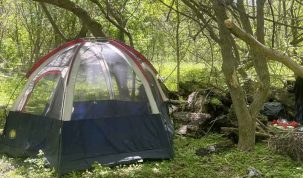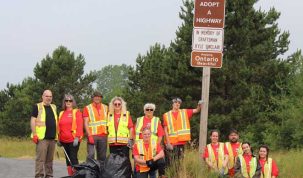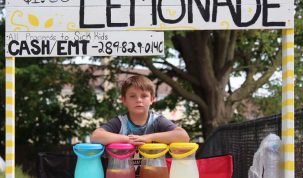By Cecilia Nasmith/Today’s Northumberland
Call it a trifecta, call it a triple threat, call it a perfect storm – the fact is that the current spike in the numbers of children fighting for breath due to respiratory infections is not just a COVID-19 phenomenon.
It’s COVID plus an exceptionally early influenza season plus respiratory syncytial virus (RSV) that are making the rounds among all age groups, but hitting those aged nine and younger especially hard.
Haliburton Kawartha Pine Ridge District Health Unit Medical Officer of Health Dr. Natalie Bocking expressed her concern at a media scrum held just two days after the province’s Chief Medial Officer of Health Dr. Kieran Moore strongly recommended masks in indoor public settings, especially school and child-care venues.
“This strong recommendation comes in response to a crisis that is clearly facing our acute-care sector that provides services to children in particular – not as a result of COVID-19, although certainly the pandemic has contributed to the current state that we are in in terms of pressures on our health-care system,” Dr. Bocking said.
“We have seen Dr. Moore come forward and speak on this, we have seen the CEO and chiefs of staff from various pediatric tertiary hospitals come forward and talk about the demands that are being placed on their services and the decisions they have had to make in order to be able to provide service to children who are acutely ill.”
She listed other stresses they have seen – longer emergency-room waits, the need for more pediatric bed (both acute care and general care), the necessity to delay or postpone surgery not considered urgent in order to divert resources to the care of children acute ill from respiratory infections.
RSV is spread by droplets, typically from coughing and sneezing. In many older children and non-senior adults, the result is cold-like symptoms. In very young children, there is the risk of very severe illness from inflammation of the small airways and bronchiolitis (where they struggle to take in oxygen and remain hydrated).
This kind of severe reaction can also be present in older adults and those with immune deficiencies, Dr. Bocking added.
We have an annual influenza season, and it usually starts toward the end of December – meaning no significant number of cases until then. It’s much earlier this year, with more than 100 cases already confirmed. And aged nine and younger, who account for almost 25% of these cases, are far more vulnerable to severe illness associated with the flu.
“These two viruses are surging at the same time on a background of on-going COVID activity, which is maintaining its moderate level, not dipping down to lower levels, creating pressure on health-care systems to respond,” she said.
While we are used to seeing announcements from Dr. Moore on COVID, this one is in response to the crisis in our pediatric health-care system. Where the elderly once seemed those most at risk, this time it’s the youngest among us. The children are getting sicker, important pediatric surgeries are being put off, parents accompanying their little ones to the emergency department are waiting 20 hours for help.
While the HKPR population skews to the senior end compared to the provincial demographic, the region does have 32,000 people under the age of 19.
“Similar to what we are seeing across the province, we are seeing a large number of our residents going to emergency departments for respiratory symptoms as well as influenza-like illness,” Dr. Bocking said.
Between Oct. 30 and Nov. 12, HKPR residents made 990 visits to emergency rooms with respiratory symptoms or influenza-like illness. Of that number, 422 – 43% – were children aged nine and under.
“That small proportion of our age group is taking up almost 50% of the presentations for severe respiratory illness.”
There is a scale reflecting the severity of these numbers. Its baseline is what might be expected in a typical season. From there, the increasing numbers put a health unit at a moderate level, an elevated level and then a high level.
HKPR is at an elevated level, she said, but not a health unit in the provinces is as low as “seasonal.”
Then there’s COVID.
“We are really seeing a maintenance at a moderate level of community transmission,” she said. And though the test positivity rate has fallen to 14%, that is still quite high. Waste-water indicators at the three HKPR sites (Lindsay, Minden and Cobourg) fluctuate – never quite getting very low, though never hitting the highs seen during the first and second Omicron waves.
Hospital admissions for COVID do continue, but they are primarily among the elderly and those with other medical conditions.
The best way to respond, Dr. Bocking said, is to take the very simple measures that have been recommended since COVID hit an unsuspecting world almost three years ago – “very practical, easy things we as individuals and collectively as a community can be doing.”
Hand washing is important. In the case of RSV for example, you might sneeze and then touch your face. If you shake hands with someone – without having washed or sanitized first – that person may then touch his or her nose, and on it goes.
Keep high-touch surfaces clean, for the same reason.
Stay home if you are sick, at least until it has been 24 hours since your fever broke or your symptoms improved.
Wear a tight-fitting mask when indoors, even in private settings such as family gatherings, where the very young or the very old might be around.
Finally, get up to date on your vaccines. The flu vaccine, in particular, has a really good track record and, though you may be used to waiting until December to get it, the season has arrived early – so don’t delay, especially in the case of children aged six months and older.
The new bivalent COVID booster includes protection against Omicron and its BA4 and BA5 variants – though the newest variants, BQ1 and BQ1.1, are soon expected to become the dominant strain. And their increased transmissibility means more COVID infections and more stress on the health-care system can be expected.
“Though if we see people committing to masking and stepping up to prevent the spread of RSV, hopefully we’ll see less of an impact from that new variant,” Dr. Bocking said.
“This is a different situation than what we have previously faced during the pandemic. COVID-19 has primarily affected those that are older, often living in long-term-care or retirement homes, with other medical conditions.
“The current challenge is related to children becoming ill, not just as a result of COVID-19 but multiple respiratory viruses. And there are some very simple easy things we could be doing right now – staying home if you are sick, wearing a mask if you are indoors, and getting vaccinated.”























